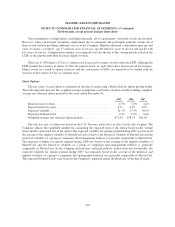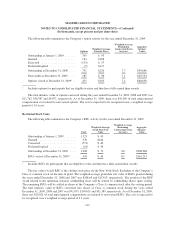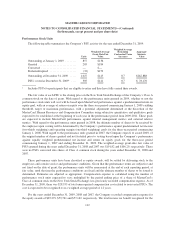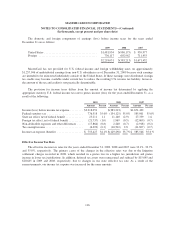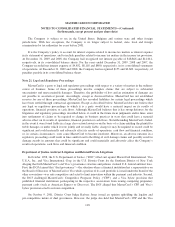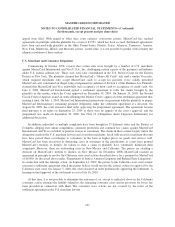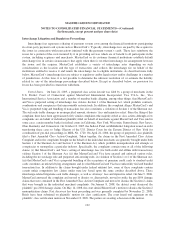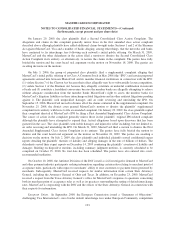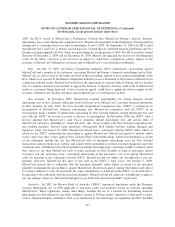MasterCard 2009 Annual Report Download - page 128
Download and view the complete annual report
Please find page 128 of the 2009 MasterCard annual report below. You can navigate through the pages in the report by either clicking on the pages listed below, or by using the keyword search tool below to find specific information within the annual report.MASTERCARD INCORPORATED
NOTES TO CONSOLIDATED FINANCIAL STATEMENTS—(Continued)
(In thousands, except percent and per share data)
The Company is subject to tax in the United States, Belgium and various state and other foreign
jurisdictions. With few exceptions, the Company is no longer subject to federal, state, local and foreign
examinations by tax authorities for years before 2001.
It is the Company’s policy to account for interest expense related to income tax matters as interest expense
in its statement of operations, and to include penalties related to income tax matters in the income tax provision.
At December 31, 2009 and 2008, the Company had recognized net interest payable of $18,866 and $14,014,
respectively, in its consolidated balance sheets. For the years ended December 31, 2009, 2008 and 2007, the
Company recorded net interest expense of $4,852, $8,118 and $800, respectively, in its consolidated statements
of operations. At December 31, 2009 and 2008, the Company had recognized $155 and $2,609, respectively, of
penalties payable in its consolidated balance sheets.
Note 21. Legal and Regulatory Proceedings
MasterCard is a party to legal and regulatory proceedings with respect to a variety of matters in the ordinary
course of business. Some of these proceedings involve complex claims that are subject to substantial
uncertainties and unascertainable damages. Therefore, the probability of loss and an estimation of damages are
not possible to ascertain at present. Accordingly, except as discussed below, MasterCard has not established
reserves for any of these proceedings. MasterCard has recorded liabilities for certain legal proceedings which
have been settled through contractual agreements. Except as described below, MasterCard does not believe that
any legal or regulatory proceedings to which it is a party would have a material impact on its results of
operations, financial position, or cash flows. Although MasterCard believes that it has strong defenses for the
litigations and regulatory proceedings described below, it could in the future incur judgments and/or fines, enter
into settlements of claims or be required to change its business practices in ways that could have a material
adverse effect on its results of operations, financial position or cash flows. Notwithstanding MasterCard’s belief,
in the event it were found liable in a large class-action lawsuit or on the basis of a claim entitling the plaintiff to
treble damages or under which it were jointly and severally liable, charges it may be required to record could be
significant and could materially and adversely affect its results of operations, cash flow and financial condition,
or, in certain circumstances, even cause MasterCard to become insolvent. Moreover, an adverse outcome in a
regulatory proceeding could result in fines and/or lead to the filing of civil damage claims and possibly result in
damage awards in amounts that could be significant and could materially and adversely affect the Company’s
results of operations, cash flows and financial condition.
Department of Justice Antitrust Litigation and Related Private Litigations
In October 1998, the U.S. Department of Justice (“DOJ”) filed suit against MasterCard International, Visa
U.S.A., Inc. and Visa International Corp. in the U.S. District Court for the Southern District of New York
alleging that both MasterCard’s and Visa’s governance structure and policies violated U.S. federal antitrust laws.
First, the DOJ claimed that “dual governance”—the situation where a financial institution has a representative on
the Board of Directors of MasterCard or Visa while a portion of its card portfolio is issued under the brand of the
other association—was anti-competitive and acted to limit innovation within the payment card industry. Second,
the DOJ challenged MasterCard’s Competitive Programs Policy (“CPP”) and a Visa bylaw provision that
prohibited financial institutions participating in the respective associations from issuing competing proprietary
payment cards (such as American Express or Discover). The DOJ alleged that MasterCard’s CPP and Visa’s
bylaw provision acted to restrain competition.
On October 9, 2001, District Court Judge Barbara Jones issued an opinion upholding the legality and
pro-competitive nature of dual governance. However, the judge also held that MasterCard’s CPP and the Visa
118




